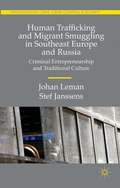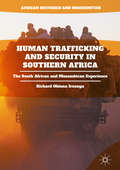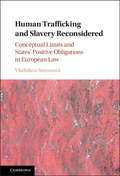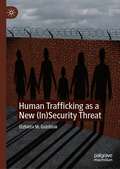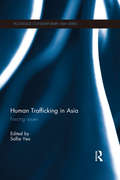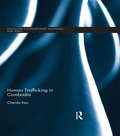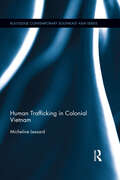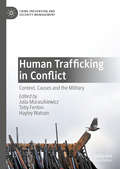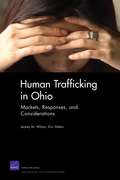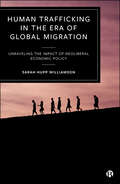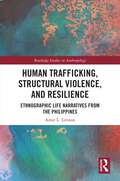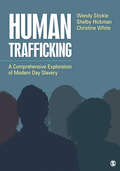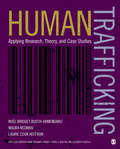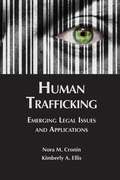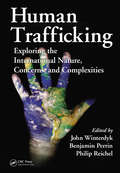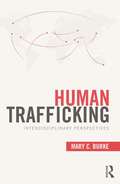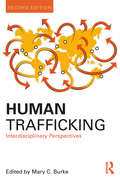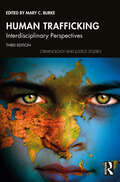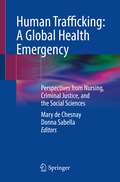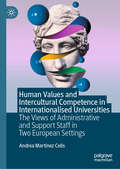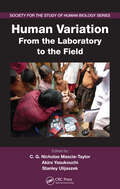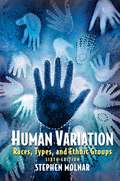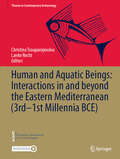- Table View
- List View
Human Trafficking and Migrant Smuggling in Southeast Europe and Russia: Learning Criminal Entrepreneurship and Traditional Culture (Transnational Crime, Crime Control and Security)
by Johan Leman Stef JanssensThrough unprecedented access to over 100 court files and sentences, and interviews with police and security personnel in both origin and destination countries, this book provides the most comprehensive exploration to date of human trafficking and migrant smuggling in Eastern Europe and Russia.
Human Trafficking and Security in Southern Africa: The South African and Mozambican Experience (African Histories and Modernities)
by Richard Obinna IroanyaThis book investigates the links between human trafficking and national security in Southern Africa. Human trafficking violates borders, supports organised crime and corrupts border officials, and yet policymakers rarely view the persistence of human trafficking as a security issue. Adopting an expanded conceptualisation of security to encompass the individual as well as the state, Richard Obinna Iroanya lays the groundwork for understanding human trafficking as a security threat. He outlines the conditions and patterns of human trafficking globally before moving into detailed case studies of South Africa and Mozambique. Together, these case studies bring into focus the lives of the ‘hidden population’ in the region, with analysis and policy recommendations for combating a global phenomenon.
Human Trafficking and Slavery Reconsidered
by Vladislava StoyanovaBy reconsidering the definitions of human trafficking, slavery, servitude and forced labour, Vladislava Stoyanova demonstrates how, in embracing the human trafficking framework, the international community has sidelined the human rights law commitments against slavery, servitude and forced labour that in many respects provide better protection for abused migrants. Stoyanova proposes two corrective steps to this development: placing a renewed emphasis on determining the definitional scope of slavery, servitude or forced labour, and gaining a clearer understanding of states' positive human rights obligations. This book compares anti-trafficking and human rights frameworks side-by-side and focuses its analysis on the Council of Europe's Trafficking Convention and Article 4 of the European Convention on Human Rights. With innovative arguments and pertinent case studies, this book is an important contribution to the field and will appeal to students, scholars and legal practitioners interested in human rights law, migration law, criminal law and EU law.
Human Trafficking as a New (In)Security Threat
by Elżbieta M. GoździakThis book challenges the rhetoric linking ‘war on terror’ with ‘war on human trafficking’ by juxtaposing lived experiences of survivors of trafficking, refugees, and labor migrants with macro-level security concerns. Drawing on research in the United States and in Europe, Goździak shows how human trafficking has replaced migration in public narratives, policy responses, and practice with migrants and analyzes lived experiences of (in)security of trafficked victims, irregular migrants, and asylum seekers. .
Human Trafficking in Asia: Forcing Issues (Routledge Contemporary Asia Series)
by Sallie YeaBy analysing the complex issues surrounding internal and cross-border human trafficking in Asia, and asserting critical perspectives and methodologies, this book extends the range of sites for discussion and sectors in which human trafficking takes place. The book re-centres human trafficking as an area of legitimate academic inquiry in a region that is often considered as an epicentre for human trafficking: East and Southeast Asia. It thus offers an in-depth analysis and up-to-date knowledge on research methodologies and engagements, patterns and forms of human trafficking, constructively critiquing anti-trafficking campaigns and discourses, and offering examples of good practice within the region that help us move beyond the impasse that currently hampers human trafficking as a field of inquiry in the social sciences. Providing constructive avenues for human trafficking research to proceed methodologically, theoretically and ethically, this book is of interest to students and scholars of Politics, International Relations and Southeast Asian Studies.
Human Trafficking in Cambodia: Human Trafficking In Cambodia (Routledge Contemporary Southeast Asia Series)
by Chenda KeoReporting the findings of a comprehensive study of human trafficking in Cambodia, this book focuses on the characteristics and operations of the traffickers. It provides a theoretical framework that explains the emergence of the phenomenon, and the role of moral panic and western hegemony in the war on human trafficking. Using a multi-method and multi-source research design, which includes an examination of police and prison records as well as interviews with 91 incarcerated human traffickers, police and prison officers, court officials, and members of NGOs, this book investigates five major themes about human traffickers in Cambodia: who are they, how do they operate, how much profit do they make, why are they involved in human trafficking, and how does the Cambodian Criminal Justice System (CJS) control their activities? A novel and unique analysis, this book is of interest to a wide academic audience in the fields of Asian Studies, Human Trafficking, Sociology, Anthropology, Political Science, Human Geography and Critical Legal Studies.
Human Trafficking in Colonial Vietnam (Routledge Contemporary Southeast Asia Series)
by Micheline LessardExamining the widespread phenomenon of human trafficking in Vietnam during the period of French colonial rule, this book focuses on the practice of kidnapping or stealing Vietnamese women and children for sale in Chinese markets from the 1870s through to the 1940s. The book brings to light the fact that human trafficking between Vietnam and China existed prior to more contemporary instances of this trade. It provides information as to the perpetrators, the nature, and the scope of this illicit commerce and its impact on the lives of its victims, who were mainly domestic servants, concubines or prostitutes. The book also examines the ways in which French colonial actors (missionaries, administrators, military officers, adventurers and observers, and consuls) reported, described, and reacted to it, and goes on to analyse the impact of human trafficking on the concept of French ‘prestige’ and on the French colonial project in Vietnam. Human trafficking in colonial Vietnam illustrates the tensions and the conflicts not only between the French and the Vietnamese, but also between the Vietnamese and the Chinese, as well as between the colons and the French colonial administration, and between the colonial and metropolitan governments. The book will be of interest to students and scholars of Southeast Asian History, Colonial History and Criminology.
Human Trafficking in Conflict: Context, Causes and the Military (Crime Prevention and Security Management)
by Hayley Watson Julia Muraszkiewicz Toby FentonThis edited book examines the different forms of human trafficking that manifest in conflict and post-conflict settings and considers how the military may help to address or even facilitate it. It explores how conflict can facilitate human trafficking, how it can manifest through a variety of case studies, followed by a discussion of the reasons why the military should include a stronger consideration of human trafficking within their strategic planning given the multiple scenarios in which military forces come into contact with victims of human trafficking, and how this ought to be done. Human Trafficking in Conflict draws on the expertise of scholars and practitioners to develop the existing conversations and to offer multiple perspectives. It includes a discussion of existing frameworks and perspectives including legal and policy, and whether they are configured to address human trafficking in conflict.
Human Trafficking in Ohio
by Erin Dalton Jeremy M. WilsonWilson and Dalton explore the extent and characteristics of human trafficking in Ohio through both a content analysis of newspaper accounts and interviews with criminal justice officials and social service providers. The authors identify and discuss sex-trafficking cases in Toledo and forced-labor cases in Columbus, and compare the two cities' responses to human trafficking. They conclude with suggestions on how these responses might be improved.
Human Trafficking in the Era of Global Migration: Unraveling the Impact of Neoliberal Economic Policy
by Sarah Hupp WilliamsonFactors such as inequality, gender, globalization, corruption, and instability clearly matter in human trafficking. But does corruption work the same way in Cambodia as it does in Bolivia? Does instability need to be present alongside inequality to lead to human trafficking? How do issues of migration connect? Using migration, feminist, and criminological theory, this book asks how global economic policies contribute to the conditions which both drive migration and allow human trafficking to flourish, with specific focus on Cambodia, Bolivia, and The Gambia. Challenging existing thinking, the book concludes with an anti-trafficking framework which addresses the root causes of human trafficking.
Human Trafficking, Structural Violence, and Resilience: Ethnographic Life Narratives from the Philippines (Routledge Studies in Anthropology)
by Amie L. LennoxThis book explores and examines human trafficking in Eastern Mindanao in the Philippines, and the social conditions which facilitate and maintain this exploitation. Through a combination of ethnographic research and life-narrative interviews, the book tells the stories of those who have experienced exploitation, and analyses the social conditions which form the context for these experiences. This book places the trafficking of migrants in context of the local social setting where migration, including human trafficking of migrants, is one of the limited options available for work. It explores how these social configurations contribute to exploitation both domestically and internationally. This book also draws on first-person accounts from those who have experienced trafficking or exploitation, offering lived experiences which reveal deep and complex cultural, social, and personal expressions of meaning, resilience, and hope within constrained, unequal, and even violent circumstances. This book will appeal to students and scholars researching and studying in the fields of social and cultural anthropology and Southeast Asian studies.
Human Trafficking: A Comprehensive Exploration of Modern Day Slavery
by Christine A. White Wendy Stickle Shelby Nichole HickmanHuman Trafficking: A Comprehensive Exploration into Modern Day Slavery examines the legal, socio-cultural, historical, and political aspects of human trafficking and modern-day slavery. While most texts only cover sex trafficking and labor trafficking, this text takes a more inclusive approach, provide coverage of what is currently known about organ trafficking, child marriage, and child soldiers as well. These topics are explored within the borders of the United States as well as across the world. The reality is that this problem is not limited to one country or, even, one continent. Technology and globalization have made this an international crisis that requires a collaborative and cooperative international response. The goal of this text is to provide an accurate understanding of all forms of human trafficking and current responses to this crime.
Human Trafficking: A Comprehensive Exploration of Modern Day Slavery
by Christine A. White Wendy Stickle Shelby Nichole HickmanHuman Trafficking: A Comprehensive Exploration into Modern Day Slavery examines the legal, socio-cultural, historical, and political aspects of human trafficking and modern-day slavery. While most texts only cover sex trafficking and labor trafficking, this text takes a more inclusive approach, provide coverage of what is currently known about organ trafficking, child marriage, and child soldiers as well. These topics are explored within the borders of the United States as well as across the world. The reality is that this problem is not limited to one country or, even, one continent. Technology and globalization have made this an international crisis that requires a collaborative and cooperative international response. The goal of this text is to provide an accurate understanding of all forms of human trafficking and current responses to this crime.
Human Trafficking: Applying Research, Theory, and Case Studies
by Noel B. Busch-Armendariz Laurie C. Heffron Maura B. NsonwuThis practical, interdisciplinary text draws from empirically grounded scholarship, survivor-centered practices, and an ecological perspective to help readers develop an understanding of the meaning and scope of human trafficking. Throughout the book, the authors address the specific vulnerabilities of human trafficking victims, their medical-psycho-social needs, and issues related to direct service delivery. They also address the identification of human trafficking crimes, traffickers, and the impact of this crime on the global economy. Using detailed case studies to illuminate real situations, the book covers national and international anti-trafficking policies, prevention and intervention strategies, promising practices to combat human trafficking, responses of law enforcement and service providers, organizational challenges, and the cost of trafficking to human wellbeing.
Human Trafficking: Applying Research, Theory, and Case Studies
by Noel B. Busch-Armendariz Laurie C. Heffron Maura B. NsonwuThis practical, interdisciplinary text draws from empirically grounded scholarship, survivor-centered practices, and an ecological perspective to help readers develop an understanding of the meaning and scope of human trafficking. Throughout the book, the authors address the specific vulnerabilities of human trafficking victims, their medical-psycho-social needs, and issues related to direct service delivery. They also address the identification of human trafficking crimes, traffickers, and the impact of this crime on the global economy. Using detailed case studies to illuminate real situations, the book covers national and international anti-trafficking policies, prevention and intervention strategies, promising practices to combat human trafficking, responses of law enforcement and service providers, organizational challenges, and the cost of trafficking to human wellbeing.
Human Trafficking: Emerging Legal Issues and Applications
by Kimberly Ellis Nora Cronin Peter BlairHuman Trafficking: Emerging Legal Issues and Applications offers practical, tested, and cutting-edge approaches to addressing human trafficking and remediating its victims. It explores new digital technologies used to investigate the crime; tools for attorneys representing victims in criminal, labor, and immigration cases; and ways to help child victims of sex trafficking. This book proposes unique solutions to human trafficking in the United States, Australia, and Europe that can be applied elsewhere in the world. It explores the intersection of human trafficking with other phenomena such as cults, drug trafficking, human rights, and gender issues. Importantly, this book unveils the cutting-edge Social Influence Model for admitting evidence of undue influence and coercion into court when trafficking victims find themselves on the wrong side of a prosecution. Written for practitioners working in the courts and on the ground, Human Trafficking: Emerging Legal Issues and Applications is an essential tool for righting the wrongs of human trafficking.
Human Trafficking: Exploring the International Nature, Concerns, and Complexities
by Benjamin Perrin John Winterdyk Philip ReichelHuman trafficking is a crime that undermines fundamental human rights and a broader sense of global order. It is an atrocity that transcends borders with some regions known as exporters of trafficking victims and others recognized as destination countries. Edited by three global experts and composed of the work of an esteemed panel of contributors,
Human Trafficking: Interdisciplinary Perspectives
by Mary C. BurkeThe practice of one human being exploiting another in slavery-like conditions is not new. Today, it is called human trafficking. Social, political, and economic forces over the past 60 years have changed how and why this human rights abuse occurs. In order to solve this or any social problem, it is important that it is fully understood. With a range of contributing subject experts from different disciplines and professions, this text comprehensively explains human trafficking as it exists and is being addressed in the twenty-first century. Human Trafficking is essential reading for professionals working in many fields, including law enforcement, human services, and health care, and for concerned citizens interested in human rights and how to make a difference in their communities. This book is also intended for use in undergraduate and graduate interdisciplinary courses in human trafficking. A bank of test items applicable to each article in the book is available to instructors interested in selecting this edition for course use. Simply send an e.mail to the publisher at saleshss@taylorandfrancis.com
Human Trafficking: Interdisciplinary Perspectives (Criminology and Justice Studies)
by Mary C. BurkeWith a range of experts from different disciplines and professions, this text comprehensively explains human trafficking as it exists and is being addressed in the twenty-first century. The first section gives an overview of the issue and contextualizes it within a human rights and historical framework. The second section provides the reader with more detailed, interdisciplinary information about trafficking. The third section, which contains a chapter written by a former FBI agent, focuses on the anti-trafficking movement and addresses international responses to the problem, as well as considerations for working with victims. Human Trafficking closes with a chapter about how trafficking is being addressed and how individuals, larger social groups, and organizations can get involved in putting an end to the crime and to helping survivors. Human Trafficking is essential reading for professionals in law enforcement, human services, and health care, and for concerned citizens interested in human rights and making a difference in their communities. This book is also intended for use in undergraduate and graduate interdisciplinary courses in human trafficking.
Human Trafficking: Interdisciplinary Perspectives (Criminology and Justice Studies)
by Mary C. BurkeIn Human Trafficking: Interdisciplinary Perspectives experts from a wide range of disciplinary and professional backgrounds provide a uniquely comprehensive understanding of human trafficking in the twenty-first century. Chapter authors consider historical, sociocultural, legal, public health, human rights, and psychological aspects of this issue. New chapters address important topics such as racism, child soldiers, organ trafficking, and the role of technology and the banking industry in trafficking. The third edition also explores the ways in which institutionalized oppression of people of color, Native Americans, and those in the LGBTQ+ community can underlie vulnerability of these populations to being trafficked. Human Trafficking is essential reading for professionals in law enforcement, human services, and health care, and for concerned citizens interested in human rights and making a difference in their communities. This book is also intended for use in undergraduate and graduate interdisciplinary courses in human trafficking.
Human Trafficking: Perspectives from Nursing, Criminal Justice, and the Social Sciences
by Donna Sabella Mary De ChesnayThis book presents various forms of human trafficking, a growing trend in the exploitation of large numbers of people with concurrent public health, socio-cultural, and economic costs to countries burdened with the consequences of the COVID-19 pandemic. Edited by psychiatric-mental health nurses and an applied anthropologist, this volume covers all forms of human trafficking: sex trafficking, forced labor, forced marriage, baby trafficking, organ trafficking, child marriage, and child soldiers with a global public health and policy focus. As such, it fills a gap in human trafficking knowledge and is built on courses springing up around the United States in multiple disciplines. Medical, mental health, and social work interventions are included as well as information about programs with documented outcomes. Each chapter includes state of the art of knowledge with case studies illustrating specific focal ideas, discussion, questions and exercises in order to help readers retain and reinforce chapter material. This textbook will be useful in the disciplines of nursing, medicine, public health, social work, and policy making, as well as in disciplines in which human trafficking is a current interest, such as law, criminal justice, and education.
Human Values and Intercultural Competence in Internationalised Universities: The Views of Administrative and Support Staff in Two European Settings
by Andrea Martínez CelisThis book investigates the perceptions of the administrative and support staff at two universities (one in Spain, the other in the Netherlands) regarding internationalisation in their institutions and their own perceived intercultural competence within their contexts. Using the Schwartz value system, the author aims also to understand and explore how human values relate to attitudes and intercultural competence more broadly. The book argues for the importance of intercultural competence of administrative and support staff in internationalised universities, as well as their key role as essential agents in promoting internationalisation. The author proposes an interdisciplinary method to evaluate intercultural competence from an emic perspective—through questionnaires and interviews—and from an etic perspective—analysing participants’ discursive constructions to reveal their human values. This volume will be of interest to academics and practitioners in fields such as linguistics, intercultural competence, intercultural and cross-cultural studies, internationalisation of higher education, and sociology.This book investigates the perceptions of the administrative and support staff at two universities (one in Spain, the other in the Netherlands) regarding internationalisation in their institutions and their own perceived intercultural competence within their contexts. Using the Schwartz value system, the author aims also to understand and explore how human values relate to attitudes and intercultural competence more broadly. The book argues for the importance of intercultural competence of administrative and support staff in internationalised universities, as well as their key role as essential agents in promoting internationalisation. The author proposes an interdisciplinary method to evaluate intercultural competence from an emic perspective—through questionnaires and interviews—and from an etic perspective—analysing participants’ discursive constructions to reveal their human values. This volume will be of interest to academics and practitioners in fields such as linguistics, intercultural competence, intercultural and cross-cultural studies, internationalisation of higher education, and sociology.
Human Variation: From the Laboratory to the Field (Society for the Study of Human Biology)
by Stanley Ulijaszek C. G. Nicholas Mascie-Taylor Akira YasukouchiThe transition in anthropological and biomedical research methods over the past 50 years, from anthropometric and craniometric measurements to large-scale microarray genetic studies has resulted in continued revision of opinions and ideas relating to the factors and forces that drive human variation. Human Variation:From the Laboratory to the Field
Human Variation: Races, Types, and Ethnic Groups
by Stephen MolnarBasic text for the sophomore/junior level course in Human Variation or Human Diversity taught anthropology or biology departments.This classic introduction to human variation, has been thoroughly updated to include the issues and controversies facing the contemporary study of diversity.
Human and Aquatic Beings: Interactions in and beyond the Eastern Mediterranean (Themes in Contemporary Archaeology)
by Lærke Recht Christina TsouparopoulouThis volume examines the role of fish and molluscs in everyday life as well as in terms of their impact on social structures, and as part of ideological and symbolic expression. Given the prevalence of anddependence on water in various forms in all regions of the Eastern Mediterranean, Egypt and Western Asia, it is no wonder that fish and other aquatic species made an impact on human lives. Yet this topic remains rather understudied. Until recently, ongoing projects in marine and freshwater species and their interaction with humans and the environment either focus on the European marine ecosystem or on themes other than the social interactions of humans and aquatic species. The chapters in this volume explore questions related to fishing practices and technologies, social status, human-fish/mollusc relations (including potential over-exploitation), and fish/molluscs in ritual practices (e.g. as temple offerings, festival consumption, burial offerings), and ideology and religion (e.g. associated with supernatural beings or sacred space, as hybrid creatures, and as represented in luxury goods). The volume also examines aquatic species as a nonalimentary resource, for example as jewellery, inlays, dyeing and medicinal purposes. The material under investigation includes faunal remains (worked and unworked), fishing gear and related tools, iconography and written sources. Many chapters also integrate multiple lines of evidence, ranging from stylistic, contextual and iconographic analyses to zooarchaeological investigations. This volume is relevant to archaeologists, zooarchaeologists, biologists and anyone interested in human-animal relations and/or the archaeology of the early Eastern Mediterranean and surrounding regions.
